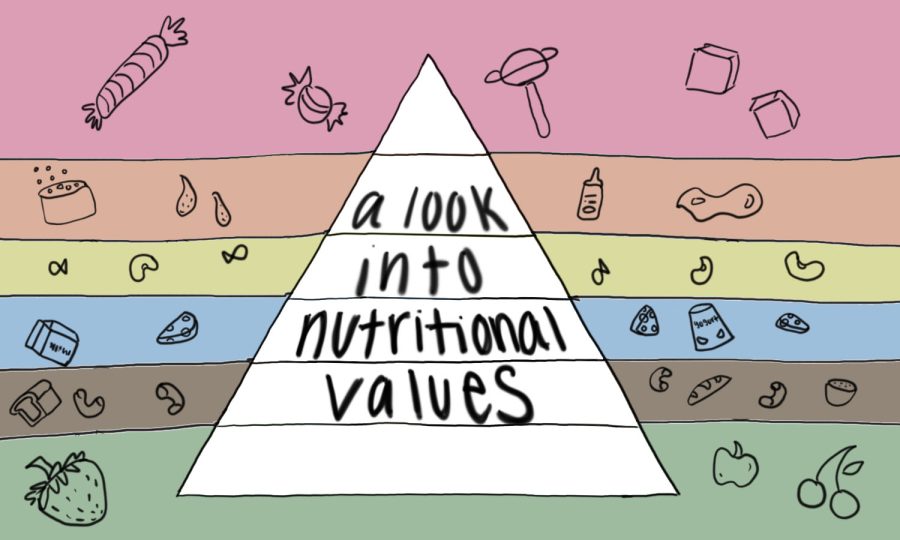Nutritional education must accommodate for students who have struggled
Discussing the problematic nature of urging students to track their eating
Valuing nutritional values too much can lead to dangerous hyper-fixation, making it essential to draw a line between nutritional education and nutritional obsession.
March 25, 2023
Content Warning: This article mentions eating disorders.
Eat X. Cut down on Y. Eliminate Z completely. That’s what’s good for you. That’s what’s healthy.
For educational purposes, there’s logic to these words — students are learning about the digestive system, which plays into nutrition.
But in middle school, I had developed a dangerous obsession regarding the content and quality of what I ate. So, in my freshman year, when we were assigned to bring a snack we loved to class to analyze its nutritional label, I panicked. Because if you’ve spent months trying to ignore nutritional labels, knowing that hyper-fixating on them may possibly send you into the same spiral that placed you under the ideal weight for kids your age, being instructed to unpack one can definitely be triggering. To preserve my mental peace, I brought the can of pistachios my dad — not me — would later snack on.
Days later, the class was assigned a “journal” (which was really just a google document) to track what we ate for three days, setting two goals that our meals should meet in terms of frequency, consumed biomolecules, exercise and overall healthiness. The assignment seemed simple enough. Though yet again, I found myself lying — not mentioning any snack or dessert item I consumed and falsifying entire meals — because I desperately wanted the paper to tell me I was healthy. So essentially, the assignment that was intended to teach me how to monitor my nutritional intake turned into a document filled with lies. Yes, there has to be a certain level of knowledge to carefully curate falsified meals that would deem me a healthy eater. And yes, the assignment still technically proved that I understood what was being taught in class. However, I know for a fact that the assignment’s intent was for me to learn, but my past struggles with eating instead made me panic — I was uncomfortable, overthinking every food I noted down, my fear of being deemed an unhealthy eater convincing me to lie and preventing me from learning anything.
When the same assignment came around next year, with me now TAing for the course, I decided to inform the teacher of how this could be problematic, and they told me there was an opt-out option that apparently had been there last year as well. When I had taken the course, I hadn’t known there was an opt-out option (how useful is an opt-out option if people don’t know about it?) but the good thing was that after I brought it up privately, they made the opt-out option clearer.
I don’t know if they would have said anything had I not spoken up. But it was nice to see how things were changing, becoming more inclusive in offering students an alternative if they did not feel comfortable logging their every meal, drink and exercise habit.
However, this begs the question of how necessary the nutritional label activity and the journaling assignment truly are — personally, on top of serving as triggering rather than educational, neither assignment taught me things I did not already know, and ultimately, were educationally ineffective.
From a distance, these assignments are extremely helpful if students have not struggled with eating in the past, as learning how to read nutritional labels is a necessary life skill and logging one’s dietary intake can help with realizing any potentially harmful patterns. But both these exercises are also deeply linked to eating disorders — making students aware of what they are consuming and how frequently they are doing so is resemblant of eating disorders such as orthorexia nervosa, which currently impacts around 27% of American teenagers. Although these assignments are not necessarily the origin of these disorders, they can still be triggering to those who have struggled or are struggling with one, as activities such as tracking food consumption are common eating disorder practices.
Yes, students are now being made more aware of alternative assignments, knowing they can opt-out and not face a drop in their grade, which is an impressive step-up from years past. Yet there is still room for improvement. For example, the nutritional label activity could be done using a label off the internet — or with a label brought in by the teacher — rather than having students analyze the label of a food they love to eat. An opt-out option to this assignment should still exist, due to the triggering nature of nutritional labels to those who have struggled. But this change to the curriculum’s assignment would convey the same message, teaching students how to read nutritional labels. It would also be less triggering because it would not actively dissuade students from their favorite foods, nor would it encourage students to lie.
Additionally students could still set dietary and habitual goals for themselves without extensively journaling — instead, they could write about how they generally plan to meet goals they set for themselves, teaching them how to develop healthy habits without forcing them to write down every little thing they eat, drink or do for a week.
Teaching nutrition correctly is difficult but important, and it’s equally important to ensure that every student feels comfortable during this unit. Students should not feel the need to lie, nor should they feel pressured to do assignments that could potentially be triggering, as neither of these allow students to learn and are counterproductive to the unit’s purpose.
Administrators and educators are the ones in power, and though they may not be able to eliminate how discussions about food can be harmful to those with eating disorders, they have the ability to mitigate the triggering nature of these assignments. Make students aware of their alternatives and modify triggering assignments to be less so.
Those with the power to do these things need to use it.
Resources for those struggling with eating disorders
- National Eating Disorders Association — online chat, call (800) 931-2237 and text (800) 931-2237
- ANAD — eating disorder recovery and support group
- Within Health — app that virtually offers eating disorder recovery and treatment programs
- Eating Recovery Center — in-person recovery process that offers therapy and rehabilitation for those struggling with eating disorders. Call (866) 489-5497.


















